|
|
|
Sort Order |
|
|
|
Items / Page
|
|
|
|
|
|
|
| Srl | Item |
| 1 |
ID:
106462
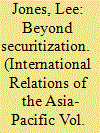

|
|
|
|
|
| Publication |
2011.
|
| Summary/Abstract |
Since the late 1980s, the scope of security policy has widened dramatically to encompass a wide range of 'non-traditional' threats. Southeast Asian states have superficially appeared to embrace this trend, broadening their security discourse considerably. However, they are also often criticized for failing to translate this discursive shift into concrete regional cooperation to tackle these new threats. This article critiques the dominant theoretical framework used to explore the widening of states' security agendas - the Copenhagen School's 'securitization' approach - as unable to account for this gap due to its fixation on security discourse rather than practice. Drawing on state theory and insights from critical political economy, the article argues that the scope of regional security policy is better accounted for by the distinctive nature of state-society relations within Southeast Asia. The argument is advanced using case studies of Southeast Asian states' policies toward Burma, environmental degradation, and border conflicts.
|
|
|
|
|
|
|
|
|
|
|
|
|
|
|
|
| 2 |
ID:
088774
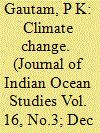

|
|
|
| 3 |
ID:
099160
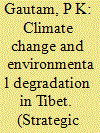

|
|
|
|
|
| Publication |
2010.
|
| Summary/Abstract |
Both the Chinese government and the Tibetans are in agreement over the impending issues relating to the adverse impact of climate change on Tibet while the India-specific data on glacier melt is as yet inconclusive. There is, however, a difference of perception in Sino-Tibetan discourse over the capitalist model of economic development being undertaken by China which is at variance with the cultural practices of Tibetans, informed and regulated as they are with the Buddhist values of oneness with nature. Nomadism is also fundamental to the preservation of the ecology of Tibet. The Chinese policy of encouraging non-Tibetan influx of population, greater than the sustainable carrying capacity of Tibet, is enhancing the danger of an ecological meltdown. Due to ecological interconnectedness and interdependence, the article argues that Tibet, the water tower of Asia, should be preserved as a regional if not a global common for the sake of south Asian security.
|
|
|
|
|
|
|
|
|
|
|
|
|
|
|
|
| 4 |
ID:
099193


|
|
|
|
|
| Publication |
2010.
|
| Summary/Abstract |
Oil remains a major threat to peace and stability in Sudan as the interim period of the Comprehensive Peace Agreement draws to a close. With a 2011 referendum for Southern secession on the near horizon, political relations between the government of Sudan and the semi-autonomous government of Southern Sudan rest precariously on a fragile economy and waning oil sector. This analysis of the political economy of oil in Sudan since 2005 finds that governance at national, regional, and local levels has largely failed to manage the damaging political and economic effects of the resource curse. Uncertainty surrounding Khartoum's oil transfers to the South, negligence and corruption among the Southern elite, and the lack of a peace dividend to offset environmental degradation in oil-bearing regions trace the multiplicity of the resource curse in Sudan. While compromises on oil between political elites offer some hope of avoiding a future North-South civil war, the regional and local dimensions of the resource curse remain critical sources of armed conflict.
|
|
|
|
|
|
|
|
|
|
|
|
|
|
|
|
| 5 |
ID:
073830
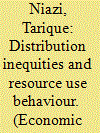

|
|
|
| 6 |
ID:
088049


|
|
|
|
|
| Publication |
2009.
|
| Summary/Abstract |
A vast number of studies addressed the environmental degradation and economic development but not financial development. Moreover, as argued by Stern [2004. The rise and fall of the environmental Kuznets curve. World Development 32, 1419-1439] they present important econometric weaknesses. Using standard reduced-form modeling approach and controlling for country-specific unobserved heterogeneity, we investigate the linkage between not only economic development and environmental quality but also the financial development. Panel data over period 1992-2004 is used. We find that both economic and financial development are determinants of the environmental quality in BRIC economies. We show that higher degree of economic and financial development decreases the environmental degradation. Our analysis suggests that financial liberalization and openness are essential factors for the CO2 reduction. The adoption of policies directed to financial openness and liberalization to attract higher levels of R&D-related foreign direct investment might reduce the environmental degradation in countries under consideration. In addition, the robustness check trough the inclusion of US and Japan does not alter our main findings.
|
|
|
|
|
|
|
|
|
|
|
|
|
|
|
|
| 7 |
ID:
135482
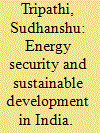

|
|
|
|
|
| Summary/Abstract |
Energy security and sustainable development are critical issues to ensure India’s economic growth and its human development objectives against the potential challenge of sustainability of its environment, not only for its millions of poor populace but also for preserving the environmental concerns for humanity at large, vis-à-vis prevailing unequal and uneven power relations in the world. As a way out, India should focus on holistic energy policies, diversification of fuel mix, clean and carbon saving technologies, R&D, energy efficiency, and also creating awareness and strengthening governance for sustainable development at the local and national levels while seeking maximum cooperation from abroad.
|
|
|
|
|
|
|
|
|
|
|
|
|
|
|
|
| 8 |
ID:
113982
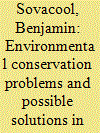

|
|
|
|
|
| Publication |
2012.
|
| Summary/Abstract |
This article explores what the academic literature tells us about environmental conservation challenges in Myanmar, and what types of domestic and international mechanisms are suited to address those challenges. It begins by providing background information on rural energy use, environmental legislation, forestry, agriculture and the country's network of protected areas. It notes, for example, that the country's protected areas face environmental degradation caused by poverty, corruption, the expansion of agricultural land and population growth. It goes on to argue that planners in Myanmar can, however, utilize a variety of mechanisms to overcome these challenges. Policy-makers can enhance community involvement in protected areas and management schemes through ownership and engagement. They could integrate conservation efforts with income generation, provide education and awareness campaigns for those living near wildlife areas and expand the number and size of protected areas. They could, furthermore, increase penalties against illegal activities within protected areas, offer accelerated staff training and education programmes and similarly consolidate regulatory authority for environmental conservation. Even those outside of Myanmar can prevent environmental destruction. International planners could implement ecosystem payments schemes, involve Myanmar more concretely in the Reducing Emissions from Deforestation and Degradation (REDD) process, an international agreement launched in 2012, and expand Myanmar's participation in [End Page 217] the Convention on International Trade in Endangered Species of Wild Fauna and Flora. Lastly, they could advocate international bans on exports of illegal products and strengthen capacity building efforts in the areas of forestry, land use and agriculture.
|
|
|
|
|
|
|
|
|
|
|
|
|
|
|
|
| 9 |
ID:
088697
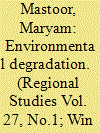

|
|
|
| 10 |
ID:
124714
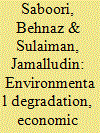

|
|
|
|
|
| Publication |
2013.
|
| Summary/Abstract |
This paper tests for the short and long-run relationship between economic growth, carbon dioxide (CO2) emissions and energy consumption, using the Environmental Kuznets Curve (EKC) by employing both the aggregated and disaggregated energy consumption data in Malaysia for the period 1980-2009. The Autoregressive Distributed Lag (ARDL) methodology and Johansen-Juselius maximum likelihood approach were used to test the cointegration relationship; and the Granger causality test, based on the vector error correction model (VECM), to test for causality. The study does not support an inverted U-shaped relationship (EKC) when aggregated energy consumption data was used. When data was disaggregated based on different energy sources such as oil, coal, gas and electricity, the study does show evidences of the EKC hypothesis. The long-run Granger causality test shows that there is bi-directional causality between economic growth and CO2 emissions, with coal, gas, electricity and oil consumption. This suggests that decreasing energy consumption such as coal, gas, electricity and oil appears to be an effective way to control CO2 emissions but simultaneously will hinder economic growth. Thus suitable policies related to the efficient consumption of energy resources and consumption of renewable sources are required.
|
|
|
|
|
|
|
|
|
|
|
|
|
|
|
|
| 11 |
ID:
173391
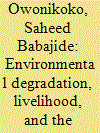

|
|
|
|
|
| Summary/Abstract |
The socio-economic conditions of the inhabitants of Lake Chad Region (LCR) in the instability of the region has been well researched. But there has been relatively little work on how environmental conditions contribute to the expanding instability of the region. Using data collected from both primary and secondary sources, this study shows how the shrinking Lake Chad contributes to the instability of the LCR. The study finds out that in the last six decades, climate change, over-exploitation and demographic pressure have contributed to the shrinking of the waterbody by over 90% leading to inability to sustain livelihoods of inhabitants. Loss of livelihoods has promoted criminality, easy recruitment by terrorist groups, migration to urban centres in search of better means of livelihood. This has also led to violent clashes and crimes in cities and towns. Furthermore, management of the shrinking lake has caused conflicts among the riparian states and this has greatly inhibited their ability to collective fight insecurity in the region. The study concludes that in enhancing the stability of the Lake Chad Region, addressing the shrinking Lake Chad must be given priority by the riparian states and other concerned stakeholders.
|
|
|
|
|
|
|
|
|
|
|
|
|
|
|
|
| 12 |
ID:
130498
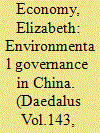

|
|
|
|
|
| Publication |
2014.
|
| Summary/Abstract |
After three decades of rapid economic growth, environmental degradation is now one of the most significant issues facing the Chinese government. The country's air, water, and land are all heavily polluted. Despite a number of environmental protection initiatives, both at the national and local levels, China ranks poorly when compared with other emerging nations. Formal government institutions have failed to address adequately the people's concerns. Beijing's system of decentralized authoritarianism lacks the political processes and incentives needed to implement meaningful national reform and to encourage local governments and polluting factories to enforce laws and regulations. The Chinese government now faces growing pressure from civil society, as NGOs, Internet activism, and protests compel the government to proactively address environmental issues. Beijing would do well to increase engagement between the government and its citizens, rather than relying on its current crisis management style of environmental governance.
|
|
|
|
|
|
|
|
|
|
|
|
|
|
|
|
| 13 |
ID:
132636


|
|
|
|
|
| Publication |
2014.
|
| Summary/Abstract |
In recent years, sustainability has represented one of the most important policy goals explored in the environmental Kuznets curve (EKC) literature. But related hypotheses, performance measures and results continue to present a challenge. The present paper contributes to this ongoing literature by studying two different EKC specifications for 10 Middle East and North African (MENA) countries over the period 1990-2010 using panel data methods. For the first specification, namely EKC, we show that there is an inverted U-shape relationship between environmental degradation and income; while for the second specification, namely modified EKC (MEKC), we show that there is an inverted U-shape relationship between sustainability and human development (HD). The relationships are shaped by other factors such as energy, trade, manufacture added value and the role of law. More interestingly, findings from the estimation show that EKC hypothesis, HD and sustainability are crucial to build effective environmental policies.
|
|
|
|
|
|
|
|
|
|
|
|
|
|
|
|
| 14 |
ID:
186422
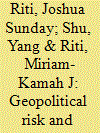

|
|
|
|
|
| Summary/Abstract |
Currently, the high incidence of environmental degradation is widely quoted as one of the key global concerns. Previous literature has examined various determinants of environmental degradation, yet, there is an inadequacy of studies on geopolitical risks (GPR) and environmental degradation nexus. Additionally, an issue of concern on aggregate estimations is aggregation bias which may cause the wrong estimation of the aggregate relationships, and mislead policymakers. This paper, therefore, investigates the impact of GPR on the environment of BRICS to assess the existence or otherwise of aggregation bias. The findings which emanate from a robust empirical estimation indicate that the relationship is positive at aggregate level while negative at disaggregated level, hence, the existence of aggregation bias in the estimation of GPR-environmental degradation relationship at the aggregate level. The results further show that the disaggregated level result does not support the aggregated level environment-GPR findings. Consequently, policy implications of aggregation bias in estimations may be drawn as follows: Since the aggregation bias may lead to a wrong environment-GPR postulation, policymakers could be misinformed by the incorrect evidence to give wrong policies about environmental concerns. Also, policymakers should consider the environment-GPR nexus at both aggregate and country-specific levels when making environmental policies.
|
|
|
|
|
|
|
|
|
|
|
|
|
|
|
|
| 15 |
ID:
123893
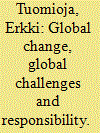

|
|
|
|
|
| Publication |
2013.
|
| Summary/Abstract |
WE ARE LIVING in a world of accelerating change and uncertainty. World population growth is the central factor behind globalization and the fact that we are living in a world characterized by growing interdependence. Many challenges are directly related to the global demographic developments, be it environmental degradation, food security or climate change.
|
|
|
|
|
|
|
|
|
|
|
|
|
|
|
|
| 16 |
ID:
097444


|
|
|
|
|
| Publication |
2010.
|
| Summary/Abstract |
Environmental Kuznets Curve (EKC) hypothesis is critical to understanding the developmental path of a nation in relation to its environment. How the effects of economic development processes dictate environmental changes can be found through the study of EKC. To understand the EKC phenomena for climate change, this study was undertaken by reviewing the available literature. As CO2, SOx and NOx are the significant greenhouse gases (GHG) responsible for global warming, thus leading to climate change, the study focused on those GHGs for EKC consideration. With an understanding of the different EKC trajectories, an attempt was made to determine the implications for the economic development of Bangladesh in regards to the EKC. It was shown that EKC for CO2 was following a monotonous straight line in most cases. SOx were shown to follow the full trajectory of the EKC in most situations and NOx was shown the hope only for the developed countries getting the low-income turning point. The type of economic policy that Bangladesh should follow in regards to the discussed pollutants and sources is also revealed. From these discussions, contributions to policy stimulation in Bangladesh are likely to be made.
|
|
|
|
|
|
|
|
|
|
|
|
|
|
|
|
| 17 |
ID:
097489


|
|
|
|
|
| Publication |
2010.
|
| Summary/Abstract |
Environmental Kuznets Curve (EKC) hypothesis is critical to understanding the developmental path of a nation in relation to its environment. How the effects of economic development processes dictate environmental changes can be found through the study of EKC. To understand the EKC phenomena for climate change, this study was undertaken by reviewing the available literature. As CO2, SOx and NOx are the significant greenhouse gases (GHG) responsible for global warming, thus leading to climate change, the study focused on those GHGs for EKC consideration. With an understanding of the different EKC trajectories, an attempt was made to determine the implications for the economic development of Bangladesh in regards to the EKC. It was shown that EKC for CO2 was following a monotonous straight line in most cases. SOx were shown to follow the full trajectory of the EKC in most situations and NOx was shown the hope only for the developed countries getting the low-income turning point. The type of economic policy that Bangladesh should follow in regards to the discussed pollutants and sources is also revealed. From these discussions, contributions to policy stimulation in Bangladesh are likely to be made.
|
|
|
|
|
|
|
|
|
|
|
|
|
|
|
|
| 18 |
ID:
081085


|
|
|
|
|
| Publication |
Berlin, Springer-verlag, 2008.
|
| Description |
xxviii, 1147p.
|
| Series |
Hexagon series on human and envioronmental security and peace
|
| Standard Number |
9783540759768
|
|
|
|
|
|
|
|
|
|
|
|
Copies: C:1/I:0,R:0,Q:0
Circulation
| Accession# | Call# | Current Location | Status | Policy | Location |
| 053191 | 333.7/BRA 053191 | Main | On Shelf | General | |
|
|
|
|
| 19 |
ID:
133286
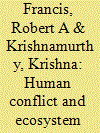

|
|
|
|
|
| Publication |
2014.
|
| Summary/Abstract |
Environmental degradation resulting from warfare is a growing concern, particularly with increasing recognition of humanity's dependence on healthy ecosystems. Though environmental legislation does exist that seeks to prevent or mitigate environmental harm before, during and after conflict, it has limited scope and effectiveness. This may be one reason why the environmental laws of war are so rarely applied in attempts to bring parties responsible for environmental harm to justice. Enforcement of such legal instruments also requires appropriate quantification of environmental damage, which is particularly difficult in a warfare context. A focus on the loss of environmental resources, habitats or ecosystems is only part of the story-the real cost of environmental damage is in the loss of ecosystem services that such resources provide, both now and in the future, and which regional and global human societies depend upon. The ecosystem services framework, wherein the costs of damage to ecosystem services are quantified in economic terms, may prove a more effective way of highlighting the environmental damage resulting from warfare. Moreover, quantification along monetary lines is potentially more likely to establish a solid case for justifiable reparations than criteria relating to loss of biodiversity or ecosystem health, which are more difficult for society and governmental agencies to place specific values on. This article discusses the ecosystem services framework in the context of warfare, and highlights both the potential and the challenges that may accompany adoption of such a framework by the international community.
|
|
|
|
|
|
|
|
|
|
|
|
|
|
|
|
| 20 |
ID:
130809
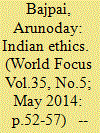

|
|
|
|
|
| Publication |
2014.
|
| Summary/Abstract |
The contemporary global community continues to be in throes of multiple problems accumulated in the course of growth and development of human civilization. The problems of violence within and among nations: rising terrorism and organized crimes in different parts of the globe; increasing poverty and hunger: threatening dimensions of food and energy crises and to cap it all pending catastrophe of climate change and other forms of environmental degradation. it is not that the global community- and nations collectively or individually are not aware of these challenges or they have failed to corrective actions. We are more aware of these problems than any time in the history of mankind. Also. we have put in place various strategies. policies and mechanisms to manage. and solve these challenges. Even global community has suddenly woken up to the call for switching over to the alternative vision of sustainable development. However. the alternative sustainable development strategy seems faltering amidst of unsustainable ideas and practices inspired by materialistic progress and over emphasis on sel?sh interests of nations and individuals alike. The moot question is how the prevailing development paradigms fashioned and refashioned to suits the needs of evolving globalized economy is capable of facing these challenges? What are its ethical foundations? What alternative ethical framework or vision we can evolve? And ?nally, how the Indian ethical framework is relevant for this alternative vision?
|
|
|
|
|
|
|
|
|
|
|
|
|
|
|
|
|
|
|
|
|